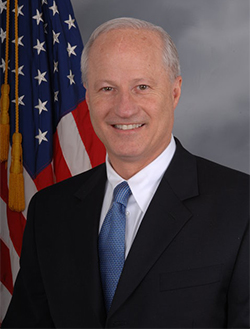Coffman Bill Takes Aim at VA
 WASHINGTON — Following the dismissal of the top Department of Veterans Affairs (VA) official in charge of construction, Rep. Mike Coffman, R-Colo., introduced legislation on March 26 that would help get the Aurora, Colo., VA hospital built while holding the VA accountable for its failures.
WASHINGTON — Following the dismissal of the top Department of Veterans Affairs (VA) official in charge of construction, Rep. Mike Coffman, R-Colo., introduced legislation on March 26 that would help get the Aurora, Colo., VA hospital built while holding the VA accountable for its failures.
Coffman’s bill raises the current authorization cap on the hospital so it can be completed, prohibits bonuses from being paid until the hospital is fully operational, requires an investigation into the billion-dollar cost overruns and transfers all future construction authority for VA hospitals to the U.S. Army Corps of Engineers.
In April 2014, Glenn Haggstrom, the ousted VA official in charge of the Aurora VA hospital’s construction, told a House Veterans Affairs Oversight and Investigation Subcomittee that the hospital would be completed by May 2015 and cost no more than $630 million. In March 2015, the U.S. Army Corps of Engineers, which took over responsibility for managing the construction of the hospital, reported that the hospital is now on track to cost $1.73 billion, and the expected completion date is now 2017.
“The massive VA mismanagement of this hospital is offensive to the veterans it is supposed to serve and offensive to the taxpayers funding the project,” Coffman said in a statement. “My bill will help get the hospital built for the veterans who deserve the care it will provide, while holding the VA accountable for its failures and ensure this never happens again.”
Coffman’s bill has four main components. First, it will bump up the spending cap for the hospital. To date, Congress has authorized the VA to spend no more than $880 million on the project. Coffman argues this spending cap must be increased in order for the U.S. Army Corps of Engineers to complete the facility.
The second part to the bill ends VA bonuses. For fiscal year 2015 alone, there is $360 million authorized for VA bonuses, according to a press statement from Coffman’s office. Coffman claimed bonus money fueled corruption by incentivizing misconduct, which led to an ongoing scandal that claims VA hospitals have excessive, possibly deadly, waiting times. Coffman points to nearly $64,000 in bonuses since 2007 that Haggstrom collected. The bill would make it illegal for the VA to award any bonus until the Aurora hospital is fully operational.
A third facet of the bill would fire the VA from any hospital construction that would cost more than $10 million. Coffman notes an April 2013 Government Accountability Office (GAO) review of four VA hospital construction projects found that the average cost overrun of each facility was about $366 million and the average time delay was 35 months. The responsibility for VA hospital construction would be turned over to the Army Corps of Engineers if the bill were to pass.
Finally, the Coffman bill orders a GAO investigation of hospital failures. If the legislation were to pass, the GAO would have to review VA’s internal investigation into the Aurora project and make an independent assessment concerning any VA official’s potential misconduct that may have contributed to the project’s inflated costs. The GAO would also be required to establish when senior VA officials knew about the cost overruns and the reasons why that information was withheld from Cognress.
